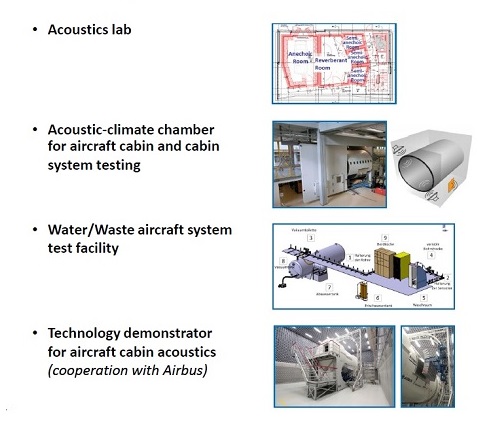Challenges on the design of future aircraft cabins with respect to low frequency sound insulation Seminar
- Time:
- 16:00 - 17:00
- Date:
- 17 May 2022
- Venue:
- Room 13/3019 and MS Teams, link below
For more information regarding this seminar, please email Vanui Mardanyan at isvr@southampton.ac.uk .
Event details
ISVR Research seminar
Travelling by aircraft has advanced to a frequently chosen mode of transport, where safety, comfort and relatively inexpensive ticket prices are appreciated by a growing number of passengers. The related increase of flights, however, becomes more and more problematic to associated emissions contributing to the observed beginning climate change. In consequence, there is a strong need for future air travel to significantly reduce pollution with CO2, which inescapably will task air framers to further increase the aerodynamic performance of aircraft, to reduce structural weight and of course to extend the efficiency of aircraft propulsion. First steps already have been realised through engines of an enlarged by-pass ratio and discussions of a rebirth of propeller engines for larger aircraft types have emerged on internal air framer´s meetings.
Apart from other difficulties coming along with the new propulsion systems, cabin acoustics obviously will be dominated from tonal sound waves especially of low frequencies penetrating easily aircraft cabin walls of today’s technology. In order to maintain passenger´s comfort experiences a huge challenge on the design of future aircraft cabins has to be completed facing numerous and strong requirements such as weight, occupied space and costs for fabrication, installation and maintenance. Additional functionalities of cabin components supporting profits of course are welcome and support the introduction of new technologies.
In this seminar, recent research results on a new cabin wall design taking into account the described field of requirements will be presented. The presentation will start with an introduction to state-of- the-art of technology with a focus on aircraft cabin acoustics and related influences followed by a description of the awaited challenges on acoustic cabin comfort. Then, a new cabin wall design concept and its recent research results will be presented, describing different passive acoustic treatments, such as metamaterials, resonators, micro-perforated absorbers and new materials to be used in a special arrangement. With some results of another design objective for a significantly reduced moisture condensation inside the cabin wall allowing higher humidity levels inside the cabin the talk will be concluded.
Microsoft Teams meeting
Join on your computer or mobile app
Click here to join the meeting
Or call in (audio only)
+44 20 3794 0272,,765144127# United Kingdom, London
Phone Conference ID: 765 144 127#
Speaker: Professor Wolfgang Gleine, Hamburg University of Applied Sciences
Biography Outline - Prof.Dr.-Ing. Wolfgang Gleine
Academic career
1976-1982 Study of physics and mathematics at the University of Hamburg
1983-1989 Research at Hamburg University of Technology, PhD in the area of integrated optics on silicon substrates
Professional career
1988-2007 Airbus (Test Centre)
Head of different organisational units for different subjects
•Development and testing of fibre optic systems and networks
•Integration of electrical cabin systems
•Tests of flight control systems
•Environmental tests (vibration, climate) of aircraft components
•Integration of fluid mechanical cabin systems
•Research, development, design and verification of cabin acoustics for all types of Airbus aircraft
Since Sept. 2007 Hamburg University of Applied Sciences
Teaching, research and industrial development in the area of
•Engineering acoustics
•Fluid mechanical cabin systems
Activities at Hamburg University of Applied Sciences
Teaching:
•Engineering Acoustics, introduction, general subjects and specific aspects for aircraft cabin design
•Fluid Mechanical Cabin Systems, system architectures, functions, system integration, theoretical and experimental system design
•Thermodynamics
•Flight laboratory, measurements taken from flight experiments with a touring motor glider
Research and Development (Acoustics):
•Passive noise treatments
•Acoustic design concepts of aircraft cabins
Theoretical and experimental based development of components, compartments and cabin sections for an optimised sound (noise) reduction design with respect to other aircraft design requirements and parameters
Transfer
•Head of a Research and Transfer Centre for Engineering Acoustics
Foundation and leadership since 2018
Design and technical project lead of new laboratory realisations
